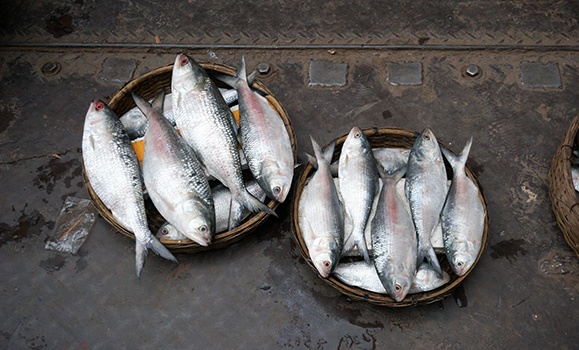As the world's population rises, so too does the demand for reliable and nutritious food sources.
Part of the challenge of filling that need involves trying to make sure the supply of healthy food is environmentally sustainable and contributes as little as possible to greenhouse gas emissions.
New research out of Dalhousie suggests those pressing needs could be met by switching to a diet heavier in seafood — a valuable source of protein, fatty acids, vitamins and minerals that scientists contend has a much smaller environmental impact than other major animal protein sources.̀ư
"Our work has shown that seafood can provide greater nutrition to people at a lower rate of greenhouse gas emissions than beef, pork, and chicken," says Peter Tyedmers, a professor in Dalhousie University's School for Resource and Environmental Studies.
Dr. Tyedmers worked with colleagues in Sweden to analyze the nutrient density and greenhouse gas emissions, weighted by production method, of globally important sources of seafood from a broad range of fishery and aquaculture sources. Their work was .
Refocusing food production
The team found that even within the same species group there can be substantial differences in climate impact, depending on the main production methods used.
They found that wild-caught salmon, small pelagics like herring, mackerel and anchovies, as well as farmed mussels and oysters, had the lowest climate impacts relative to their nutritional value. Half of the seafood species had a higher nutrient density and emitted fewer greenhouse gases than beef, pork and chicken. In contrast, both farmed and wild-caught crustaceans, like shrimp and lobster, and cephalopods, such as squid and ocotpus, all result in higher than average seafood emissions while providing lower than average nutritional scores.
The findings suggest that policies to promote seafood in diets as a substitute for other animal protein could improve future food security and help address climate change.
"While many hurdles need to be overcome, we have the potential to reshape seafood production and consumption towards species that optimize nutrition while minimizing climate emissions in terms of which species are produced and how," the paper states.
"We recommend refocusing and tailoring production and consumption patterns towards species and production methods with improved nutrition and climate performance, taking into account specific nutritional needs and emission reduction goals."
It's estimated that seafood accounted for 17 per cent of the world's intake of animal protein in 2017. The authors say that while much of the public debate around diet is focused on the so-called 'green shift' to plant-based alternatives, not enough attention is given to a possible 'blue shift' in which aquatic-sourced foods play an increasingly important role.
Related reading:̀ưCanadians love salmon but are misinformed about its production and concerned about its cost

